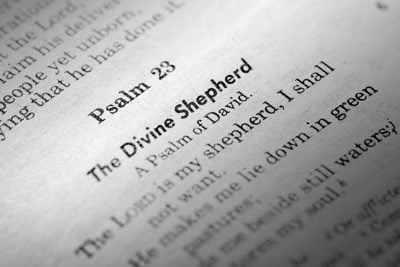The Songwriter’s Greatest Resource

What single activity is most helpful to a songwriter who wishes to compose excellent lyrics for songs of worship? Regular, careful, prayerful reading of the Psalms. I tend to avoid grandiose generalizations like this. But in fact, I do believe that the Psalms are the single greatest resource for worship songwriters.
For centuries the Psalms have inspired the best Christian songwriting. In 1719, for example, Isaac Watts composed a hymn based on Psalm 98. It began, “Joy to the world, the Lord is come.” Almost three centuries later, Matt Redman used Psalm 84 as the basis for his stirring song, “Better is One Day.” These are two among thousands of examples where the Psalms have motivated marvelous songwriting.
The book of Psalms is itself, a collection of worship songs, the most well-used and beloved collection of all time. Consider the fact that we continue to sing songs written 3,000 years ago. Now that’s lyrical longevity!
But the book of Psalms is not only the most popular anthology of worship songs ever gathered, it is also a divinely-inspired collection of prayers. Whereas much of the Bible comprises God’s words addressed to human beings, the Psalms are made up of human words to God. Yet these words are not merely human. They have been inspired by God’s own Spirit. Therefore, if you want to know what the Lord desires in worship songs, look no further than the Psalms.
What might songwriters learn from the Psalms? I could write a book answering this question. For now, let me mention briefly four characteristics of the Psalms that all songwriters should emulate.
Diversity
If you read through all the Psalms, and not just a few greatest hits, you’ll be astounded by the variety of expressions you’ll find. To be sure, there’s ample, boisterous praise. But there’s also desperation, even doubt, over God’s goodness. Some psalms contain blunt confessions of sin, while others call forth humble worship before the divine King. Diversity is found, not only throughout the corpus of the Psalms, but also within individual chapters. Psalm 22, for example, runs the gamut from deep despair, through desperate lamentation, to confident hope.
The variety of the Psalms will help you avoid the widespread tendency to get into a lyrical rut, repeating the same ideas and words over and over again. The Psalms encourage us to broaden the scope of our lyrics.
Poetry
The Psalms are filled with poetry. Of course, they contain Hebrew poetry, characterized by parallelism rather than rhyme. Both English and Hebrew poetry are marked by distinctive rhythm and evocative images. Poetry, in addition to conveying truth, sparks emotion and imagination.
It’s not easy to write poetry, which explains why so much contemporary worship music falls flat when read aloud. If we aspire to write lyrics that pierce the souls and remain on the lips of worshipers, then we’ll allow the Psalms to teach us to be poets.
Theology
The Psalms are theological in that they reflect and reveal the nature of God. A systematic theologian might say, “God is our strong Savior, therefore it’s right to praise Him.” The psalmist sings, “Praise be to my Rock! Exalted be God my Savior!” (18:46). When we compose lyrics, we too must attend to their theological substance. Songwriters should regularly ask themselves: “No matter how much I love this song, does it accurately represent who God truly is?”
Authenticity
David and the other psalmists open their lives in the Psalms. There is no pretense or posturing in their worship, lament, confession and rejoicing. The psalmists didn’t write to sell albums, not that there’s necessarily anything wrong with this. But the current temptation to write a worship hit can easily distract us from the need for spiritual authenticity in our songwriting. The Psalms get us back on course, modeling genuineness and selfless humility. Immerse yourself in the Psalms, and your songs will tell the truth of your own soul even as they proclaim the truth of God.
Conclusion
Do you want to write songs that honor God while at the same time transforming the minds and touching the hearts of worshipers? Then read, study, memorize, meditate upon and pray the Psalms—every day.
The Rev. Dr. Mark D. Roberts is a pastor, author, leader, speaker, blogger, and consultant for Christian organizations. Find out more here.
What's Your Reaction?
The Rev. Dr. Mark D. Roberts is a pastor, author, leader, speaker, blogger, and consultant for Christian organizations. Currently, Mark is the Executive Director of the Max De Pree Center for Leadership at Fuller Seminary in Pasadena, California. In this role, he provides visionary, strategic, and tactical leadership for the Center, which seeks to serve leaders so they might flourish in life and leadership. In addition to serving leaders directly, the De Pree Center helps churches so they might encourage, teach, mentor, form, and support marketplace leaders. Part of Mark’s work for the Center involves serving leaders and churches by writing Life for Leaders, a daily, digital devotional that is emailed to over 5300 subscribers each morning.





